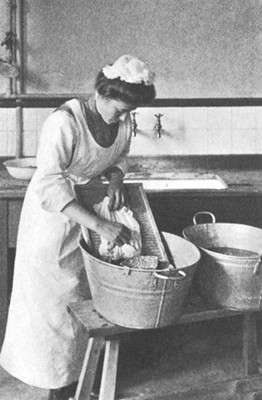英国佣人
Life below stairs
阁楼下的生活
Servants—in their own words
仆人的自述
WINSTON CHURCHILL'S valet always said the great man could not dress himself: “He sat there like a dummy and you dressed him.” Whether anyone ironed the wartime prime minister's shoe laces, washed his loose change or made sure the yolks in his boiled eggs were centred, Lucy Lethbridge does not say. But as she shows in this absorbing history, much of it in the words of servants, such things were the rule in some houses.
WINSTON CHURCHILL的男仆总是说,该伟大的男人无法自己更衣:“他笨拙地坐在那里,让你给他穿衣。” Lucy Lethbridge并没说战时是否有仆人为首相熨鞋带、洗零钱、确保餐桌上有水煮蛋蛋黄。但她在书里展现的这段历史引人入胜,用仆人的话来说,这些都是作为仆人的义务。

This is the extreme end of Ms Lethbridge's survey—a vivid sweep from ducal palace to suburban villa, from lordly butler to Barnardo's orphan, from decaying gentry and aspiring middles to the foreign nannies and cleaners of today. Her subject is many-branched and full of pressing issues, not least, the status of housework itself. All the same, there is a peculiar fascination about the old order, with its skivvies and tweenies and gentlemen's gentlemen. This is where the class system most resembled a theatre of the absurd, where maids became invisible by turning their faces to the wall as their master walked by. Virginia Woolf captures the ethos brilliantly in “Mrs Dalloway”, where a society lunch is apparently magicked into existence. Tables self-spread with glass and silver, food self-cooks and is served, not by working women, but by handmaidens, “adepts in a mystery”.
Ms Lethbridge向我们展现了截然不同的生活场景—从公爵官邸里忙碌的大扫除到僻静的郊区住宅,从贵族男管家到Barnardo的孤儿,从衰落的贵族、兴起的中产阶级到外国保姆,如今的清洁工。所列议题广而紧迫,尤其是家务劳动本身的情形。但过去关于下等佣人、女仆、贴身男仆的约定俗成也同样令人好奇。 这就是阶级体系与荒诞派戏剧最为相似的部分,一看到主人,女仆们就要扭头脸贴墙变成隐形人。Virginia Woolf在《达洛维夫人》一书中绝妙地捕捉了这种社会现象。社交午餐何其充满了魔力,餐桌自己摆上了杯具和刀叉,食物自己煮好端上桌。其实这些并非职业女性所为,而是出自“善于隐形”的女仆之手。
Ms Lethbridge is good on the mystifications that enveloped both employers and employed. Most servants were drudges or “slaveys”. It was estimated that a maid carried three tonnes of hot water up and down stairs each week. And they were expected to be grateful for a place in a home rather than a factory (often they were). A home, so the myth went, was a haven of moral purity and order. Even its furniture was sanctified. According to one advice book, a maid should keep a place in her heart for it, next only to family. No amount of digging with chapped fingers into greasy saucepans could shake the employers' sense of conferring a privilege.
Ms Lethbridge擅长刻画雇主与佣工身上的神秘莫测。大多数仆人过去做过苦力,当过“奴隶”。据估计,一个女仆每周要拎三公吨的热水楼上楼下地忙碌。对此他们心存感激,因为他们可以住在称作家的地方,而不是住在工厂。家如同神话般被视为纯洁的道德和秩序的庇护所。就连家具都充满了神圣感。一本指南里写道,女仆应当忠于它们仅次于忠于这个家庭。女仆用皲裂的双手清洗油锅洗得再多也不会动摇雇主享受特权的信念。
Nor could anything modernise them. American innovations, such as rubber gloves, detergents and vacuum cleaners, took decades to arrive in Britain. True cachet lay in the old and customary. There is a wonderful story of footmen having to remove for cleaning all the electric lamps each morning, as if they were oil lamps. As for Lloyd George's 1911 bill to bring in compulsory insurance and unemployment benefits for servants, there was uproar; the delicate balance between employer and servant would be destroyed, it was said.
没有事物能让英国佣人与时俱进。美国的发明创造,像是橡胶手套、洗涤剂、吸尘器,过了几十年才在英国流行起来。老派的作风习惯体现了真正的贵族威望。有个有趣的故事是说一名男仆每早起来都要卸下灯泡并清洁,搞得它们跟煤油灯似的。就在1911年,Lloyd George专门为仆人开设法定保险与失业津贴一事引起骚动;舆论说这将打破雇主与佣人间微妙的平衡。
Victorian and early-20th-century domestics were the largest single group of workers in Britain after agricultural labourers. Yet histories of the working class have neglected them. Scorned by their peers as flunkeys, they felt constrained by their position from doing much more than sing rudely over the washing-up. In telling their story so fully and humanely, Ms Lethbridge manages to suggest what the words to that song might have been.
维多利亚及二十世纪初期的英国,佣人是继劳农群体后最大的工人群体。而工人阶级的史料中却遗漏了这一群体。同阶层的工人蔑视他们,认为他们是奴仆,社会地位让他们无路可寻,只能边洗餐盘边唱悲歌。Ms Lethbridge通过完整人道的故事叙述,成功说明了那些歌声到底意味着什么。













